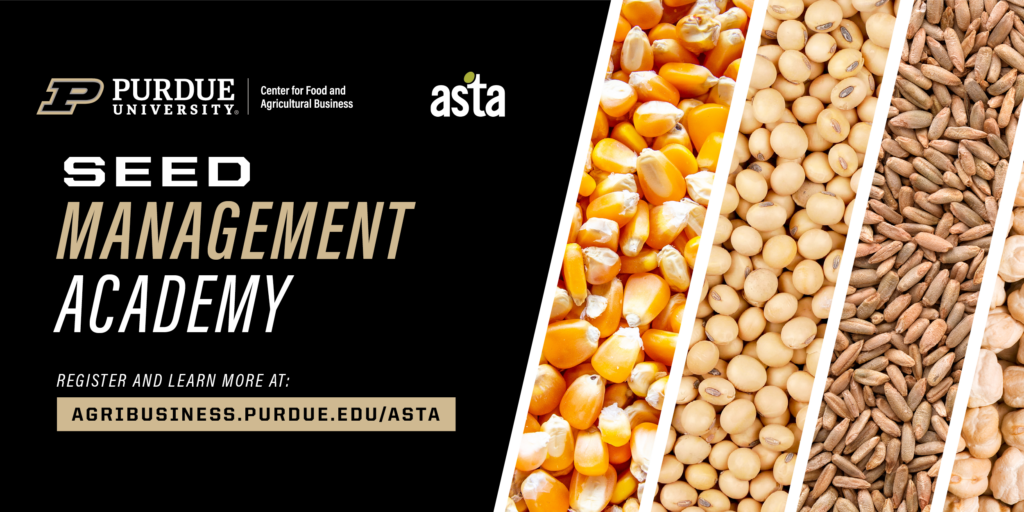 Author: Dr. Dave Downey, Executive Director Emeritus and Professor Emeritus
Author: Dr. Dave Downey, Executive Director Emeritus and Professor Emeritus
Purdue University’s Center for Food and Agricultural Business was launched in 1986 as a new way for the university to serve agriculture.
I have always believed the land grant university system has been one of the most powerful factors in making America a strong nation. More than 150 years ago, our foresighted leaders recognized the potential impact of combining basic and applied agricultural research with strong outreach. They understood that such a system could leverage the creativity of U.S. farmers to use our rich natural resources more effectively and become the most efficient food-production country in the world. And so it has become.
Purdue University has long recognized of the role of agribusiness in influencing the adoption of technology on U.S. farms since the early days of Dr. Earl Butz in his tenure in as the head of the Department of Agricultural Economics, dean of agriculture and U.S. secretary of agriculture. That tradition has carried on for more than 50 years as his successors have embraced the role of agribusiness as important to the success of farmers in increasing productivity.
In the post-WWII era, agriculture was increasingly impacted by the emergence of regional and national companies that were developing and using more complex and effective solutions for farmers. Hybridization of corn, blending fertilizer elements into nutrient programs based on soil tests, agricultural chemicals for weed and disease control, breakthroughs in animal health and higher horsepower farm equipment were only a few of the technological advancements that required larger investments and more sophisticated approaches to serve more modern agriculture. The land grant university system was well established and provided very useful assistance to technology-hungry farmers. Local farm cooperatives and private companies began to grow in size and sophistication to meet the demands of more technologically savvy farmers.
Not only did farmers require continuing education to stay abreast of rapidly emerging technologies, but agribusinesses were in need of management tools to stay ahead of the demands of their customers and remain viable in highly competitive markets. While many universities were providing educational programs for cooperatives and localized agribusinesses, the market was already trending toward ever-larger regional and even national cooperative and private agribusinesses. State lines were no longer useful boundaries for universities to define the scope of their activities. Many agribusinesses had widespread operations serving farmers in many different areas. Traditional approaches to limit programming to specific geographical areas needed to give way to a different structure with much the same educational objectives, but geared toward working with larger and more diverse agribusinesses.
The Center is Born
This was the rationale for launching the Center for Food and Agricultural Business within the Department of Agricultural Economics 30 years ago. Purdue could work more effectively and efficiently with the rapidly growing agribusiness community. It was to be national in scope and focus on professional development for executives, managers and salespeople bringing new technologies to farmers.
The center was founded as an entrepreneurial effort. Strong administrative support came with the caveat that it would be self-financed with all costs covered by revenue generated by projects and programs, with any additional funds generated going to support graduate students and research.
The center operates without any direct university funding or grants. This has always forced center faculty and staff to be keenly aware of the critical need to create value for every participant, because business can succeed long without the customers’ perception that value received exceeds their cost. This unusual business model within the university system forces constant attention to quality of both the educational experience and the details of the on-campus experience.
People have high expectations and they have choices. Since the beginning, meeting and exceeding participant expectations has been the mantra of center faculty and staff. Facilities, food, logistics, materials and interactions with staff and faculty must be high quality and consistently delivered for the center to grow, or even survive.
Among our first major programs, was “Pioneer Institute,” designed for Pioneer Hybrids field and corporate management. Another early program was designed for about 200 Case IH field sales and marketing personnel. Dr. Tom Funk, a Purdue graduate teaching agri-marketing at the University of Guelph, and I launched the five-day Strategic Agri-Marketing program in the early days. It was taught annually for over 25 years and has now evolved into a new Executive Agri-Marketing program taught by my son, Dr. Scott Downey, and Tom’s son, Dr. Justin Funk. Our popular American Seed Trade Association Management Academy is now in its 30th year. We also now offer an Agricultural Retailers Association Management Academy that regularly fills to capacity.
The center has grown dramatically, reaching hundreds of agribusiness professionals annually. In 2015, our nine open-enrollment programs alone attracted nearly 250 participants. Our sales, strategy, marketing and management programs continue to grow in popularity. The center also is now offering online programs both custom-designed and publicly offered, such as Scott Downey’s “Value of Evidence-Based Sales Decisions”and Dr. Allan Gray‘s “Producer Strategy Panel” digital video courses.
Research as a Foundation
An important element in the center’s success has been the ongoing research that is the foundation for much of our professional development programming. The Large Commercial Producer Survey, a national study of farmer buying behavior across agricultural commodity sectors, has long been a staple. These studies have provided a rich information base for agribusinesses to deepen their understanding of how farmers make purchase decisions. It also has allowed us to identify critical trends in our rapidly changing marketplace.
We are now planning our sixth such study to be completed in early 2017, which will again become the centerpiece of our 2017 National Conference for Agribusiness. The conference attracts several hundred agribusiness leaders.
Executive Education
Along the way, it became abundantly clear that there was a rapidly growing need for highly trained professionals who had strong management capabilities, but also were well-grounded in the economics of agriculture. Under the leadership of Jay Akridge, who is now the Glenn W. Sample Dean of Purdue Agriculture, the center created a dual-degree MS-MBA in Food and Agribusiness Management program to prepare graduates for industry leadership.
This 27-month program is offered primarily online with four in-person residencies. Students earn an MBA from Indiana University’s Kelley School of Business and an MS in agricultural economics from Purdue. Since 2003, we have now graduated 15 classes of dual-degree MS-MBA students. A sixteenth cohort is set set to graduate in August and another in 2017.
Global Agribusiness
Today, agribusiness is global. The center recognizes the critical importance of building working relationships with international businesses and academic institutions worldwide. It’s just not possible to be relevant without an understanding of international issues. Our MS-MBA program has included work with sister institutions in South America, Europe and Asia. An example is our relationship with Dr. Marcos Fava Neves at the University of Sao Paulo, Brazil. This has resulted in several joint project and opportunities for US and Brazilian students and agribusiness professionals to travel abroad and learn together in both countries.
Many of the center’s programs now have a strong international component. Our faculty also have delivered programs in South Africa, Singapore, Australia, China, Brazil, Switzerland, Belgium, The Netherlands and several other countries around the world.
We believe these experiences also enrich the faculty and staff as they continue to grow professionally.
Passionate Faculty and Staff
Faculty and staff who are passionate about agribusiness have been the core of the center’s success. Purdue has been blessed with talent—some of the best agribusiness academics in the country are here.
And then there are the all-important CAB staff who are outstanding in their understanding of how to build and manage programs from inception through delivery. There are so many moving parts, working together to deliver excellence to every participant. They include marketing, program design and development, organizing and managing logistics and supporting information systems and online programs—just to name a few.
Having been deeply involved in developing and managing programs for most of my career, I have great appreciation for the complexity, difficulty and importance of this work. The way our participants feel about our professionalism and the way they have been treated in our programs is a huge part of the center’s success.
Center for Commercial Agriculture (CCA)
The ultimate goal of the Center for Food and Agricultural Business has always been to provide professional development to the agribusiness sector that would translate into greater efficiency in American agriculture and better products and services for farmers. Farms have been growing in size and sophistication as fast as—or faster than—the agribusiness sector. Why shouldn’t we look at farming the same way we do agribusinesses? Farms are businesses.
Thus, our sister center was born. The Center for Commercial Agriculture, or CCA, was formed in 2012 to focus on the business needs of larger commercial farms. CCA works across state lines and is a natural companion to the Center for Food and Agricultural Business.
CCA is strongly supported by many of the agribusiness clients who depend on the Center for Food and Agricultural Business for important professional development work within their organizations.
Faculty and Facility Resources
From the beginning, the strategy of the Center for Food and Agricultural Business was to go well beyond being a showcase for Purdue faculty. With strong administrative support, our philosophy has always been to search out the best resources available from other universities, agribusinesses, private consultants and government agencies to address the needs of our clients. Our job is to combine resources to create highly effective professional development programs for agribusinesses. We negotiate and demand the best facilities our university has to offer to create a positive learning environment for our clients.
Most recently, we received a generous grant from Beck’s Hybrids that has enabled a major renovation of the seventh floor of the Krannert Building specifically to meet our center needs—including a seminar room built for 48 participants, several breakout rooms, a studio to meet the increasing demand for distance learning courses and office space for our faculty and staff. After thirty years of trying to find nooks and crannies to work in, we feel like we have died and gone to Heaven!
The Next 30 Years
In the last 30 years, the Center for Food and Agricultural Business has evolved from one faculty person with a dream and a part time assistant, to four faculty members who spend the vast majority of their time teaching classes, researching, developing educational materials and championing center programs, alongside 13 full-time staff, each with their own special roles.
I fully anticipate that in the next 30 years and beyond, the center will continue to grow. The faculty and staff have a passion for it. They hunger for opportunities to create new and innovative approaches to professional development. They get excited when an established client brings a new project. They love deepening client relationships and developing new ones. They embrace change as the complexity and importance of agriculture grows.
Our world will most certainly continue to change rapidly. We already live in a global marketplace. Farms and agribusinesses will continue to consolidate. Advances in technologies are almost unfathomable. New regulations will be challenging. U.S. agriculture can and must play a critical role in feeding a growing world population.
We have learned a lot in the last 30 years, which gives us a platform to succeed in a demanding future. We look forward to the challenge.
:



